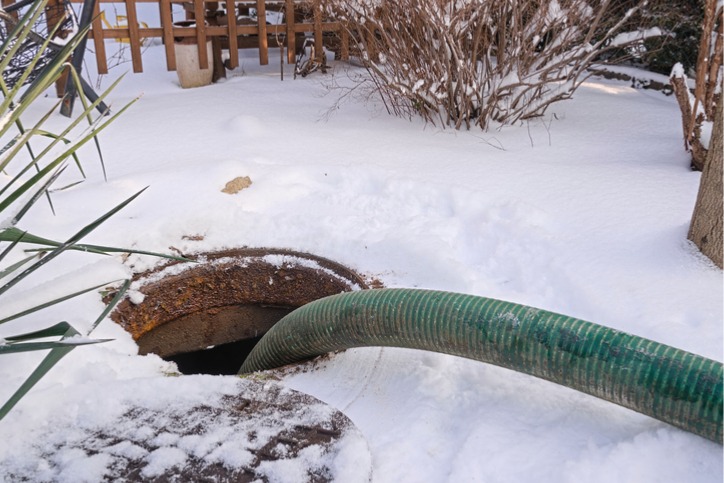Let’s Know about Septic Tank Pumping in Winter?
During the winter months, septic system owners may wonder whether their system is at risk of freezing. Understanding the risks of freezing is essential to prevent any potential damage to the septic system. Septic tank pumping in winters becomes especially crucial during this time. The cold weather can pose significant challenges to the proper functioning of the septic tank and its components. Freezing temperatures can lead to the solidification of the sewage and cause blockages within the tank, drain field, or pipework. It can also hinder the natural processes of decomposition of organic matter, leading to a buildup of sludge and scum at the bottom of the tank.
To prevent freezing in the septic tank, various measures can be taken. Insulating the septic tank and the surrounding area can help in retaining some of the heat generated by the bacterial activity within the tank. Additionally, using heated blankets or wraps specifically designed for septic tanks can provide an extra layer of protection against freezing temperatures. Another approach is to keep the septic system active during cold weather by minimizing the water usage and dispersing it evenly over time to maintain a consistent temperature within the tank.
If the septic tank has already frozen, thawing it is imperative to prevent further damage. Thawing a frozen septic tank can be a challenging task and may require professional assistance. It is crucial to address the issue promptly to avoid potential repercussions on the overall functionality of the septic system.
Is it Safe to Pump a Septic Tank in Winter?
Pumping a septic tank during winter months raises concerns about the potential effects of cold weather on the process. Cold temperatures can affect the viscosity of the sewage, making it thicker and more challenging to pump. In some cases, the pumping equipment may struggle to operate efficiently in extreme cold. However, with proper precautions and adherence to guidelines, it is safe to pump a septic tank in winter.
There are specific guidelines that need to be followed when pumping a septic tank during cold weather. These include preheating the equipment, using insulation to keep the pumped sewage from freezing, and ensuring that the process is completed as quickly as possible to minimize exposure to the cold. It is advisable to seek professional assistance for winter septic tank pumping to ensure that the process is carried out effectively and without any adverse effects on the system.
Professional septic services specializing in winter septic tank pumping can provide the necessary expertise and equipment to handle the process efficiently and safely. They are equipped to handle the challenges posed by cold weather and ensure that the pumping is conducted without compromising the integrity of the septic system.
How to Protect Your Septic System in Winter?
Protecting the septic system during winter is crucial to prevent potential issues arising from freezing temperatures. Insulating the septic tank is an effective method to safeguard it from the cold weather. By insulating the tank and the pipes around it, the heat generated by the bacteria in the tank can be preserved, reducing the risk of freezing.
Use of heated blankets and wraps designed specifically for septic tanks can provide additional protection against freezing temperatures. These specially designed covers can help in maintaining an optimal temperature within the tank, preventing any solidification of sewage or blockages due to cold weather.
Another important aspect of protecting the septic system in winter is to keep it active, albeit at a reduced capacity. This can be achieved by regulating the water usage and ensuring that the wastewater is dispersed evenly over time. By minimizing the load on the septic system during cold weather, the risk of freezing can be mitigated.
What Happens if the Septic System Freezes?
If the septic system freezes, it can lead to various symptoms that indicate the issue. These may include slow drainage, foul odors emanating from the drains, gurgling sounds in the plumbing, or sewage backups in the house. Once the freezing of the septic system is identified, immediate action is required to thaw and repair it to restore normal functionality.
Thawing and repairing a frozen septic system can be a complex process and may require professional intervention. It involves carefully thawing out the frozen components while ensuring that any potential damage is addressed. Preventive measures also need to be implemented to avoid future freezing incidents and protect the septic system from the adverse effects of cold weather.
Preventive measures for future freezing may include insulating the septic tank and pipes, minimizing water usage during extreme cold, and following a regular maintenance schedule to ensure the system remains functional throughout the winter months.
Professional Assistance for Septic Tank Pumping in Winter
Seeking professional assistance for winter maintenance of the septic system is advisable to address any potential issues effectively. Professional septic services can provide valuable insights into maintaining the system during the colder months and offer the necessary expertise for addressing winter-related challenges.
Professional maintenance during winter is crucial to prevent any disruptions in the functionality of the septic system. It can help in identifying and addressing any potential issues early on, ensuring that the system remains operational year long. The benefits of professional winter maintenance extend to preserving the longevity of the septic system and preventing costly repairs due to winter-related damage.
Choosing the right service provider for winter septic system maintenance is essential. It is important to opt for a licensed septic service with experience in handling septic systems in cold climates during the winter months. By selecting a reputable and reliable service provider, septic system owners can ensure that their system remains in optimal condition throughout the winter season.







